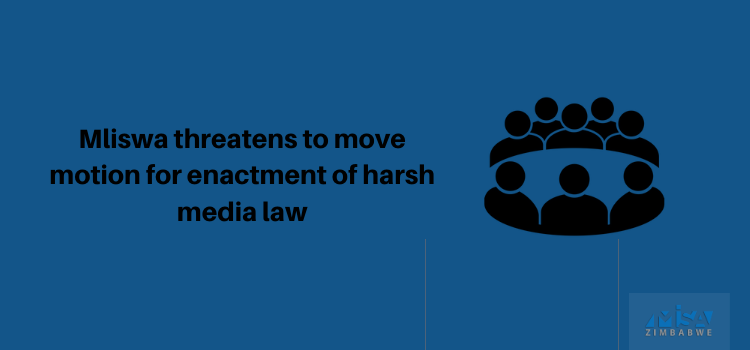Independent Member of Parliament for Norton, Honourable Temba Mliswa on 11 February 2021 threatened to move a motion in parliament for the enactment of a harsh media law that imposes custodial sentences for unethical journalists.
Speaking at a press conference in Harare, Honourable Mliswa said he would influence the ruling Zanu PF to use its two-thirds majority in parliament to enact the law.
MISA Zimbabwe position
Honourable Mliswa’s remarks are unfortunately discordant as they come at a time when the government is progressively forging ahead with the media policy and law reform processes in sync with the constitutional provision that provides for media freedom.
The reform process has seen the unbundling of the restrictive Access to Information and Protection of Privacy Act (AIPPA), through the enactment of the progressive Freedom of Information Act which gives effect to citizens right to access to Information.
In the same vein, the Zimbabwe Media Commission Bill now awaits enactment into law by the President. This should set the course for the proposed Zimbabwe Media Practitioners Bill which, if enacted into law, will foster media accountability and professionalism through a media co-regulatory mechanism together with the Zimbabwe Media Commission (ZMC).
It is therefore regrettable for Honourable Mliswa to threaten for the enactment of a law that will criminalise the profession of journalism in violation of the constitutional provisions on media freedom. Media freedom is at the core of citizens’ right to free expression and access to information which are the pillars of free and democratic societies.
MISA Zimbabwe, on the other hand, urges the media to be professionally meticulous and thorough in their work by sticking to the ethics of the profession which stress the tenets of accuracy, fairness and balance in their reportage.
The media should always take into account that freedom of expression and of the media excludes, among others, incitement to violence, hate speech, malicious injury to a person’s reputation and right to privacy.
In the meantime, MISA Zimbabwe urges Honourable Mliswa to use the democratic route by lodging any complaints he might have against the media with the Voluntary Media Council of Zimbabwe or the ZMC for adjudication and redress of his issues and concerns.









